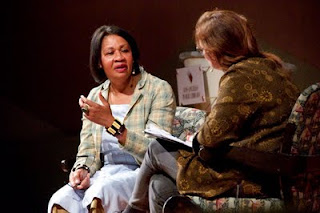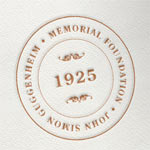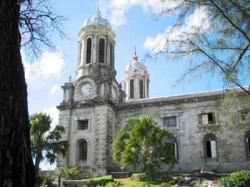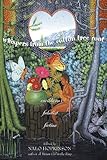Last night, I re-read the Jamaica Kincaid
Salon interview (1995) and found the quote I was remembering but didn't know from where: "
I have at my disposal a way of articulating things about her that she can't respond to." But she goes on to say that her
mother shouldn't have had children and that she thinks
her mother doesn't read her books." I used that Kincaid sentiment in an article I wrote and submitted for publication, but I remember not wanting to look for where it came from. I questioned the truth of the sentiment, I think. And also the idea that Kincaid's mother didn't love her and/or vise versa.
Recently, I read another article (by Maya Sela, 2010) in a newspaper that was written when she went to Israel this summer, she said that she thought her mother did read her work. She said, "She did read it. She was jealous of me. She just simply couldn't believe it." Kincaid goes on to explain the curious literary path her life took: "It really is an improbable story, my life. I mean, I grew up in this poor place, with very limited circumstances, at about 16 years of age was sent by my family to work, and instead of remaining in the position into which I was sent, I somehow worked my way out of it without any help from anyone, just luck." I think she means without family help or support because she does talk about a network of connections from Michael O'Donoghue (Saturday Night Live writer) who introduced her to George Trow (writer at The New Yorker) who then introduced her to William Shawn (editor of The New Yorker) and that these connections would be called help.
Her mother's reaction to her writing career is interesting: "[My mother] always thought that my becoming a writer was a form of putting on airs. She always thought I wanted to be something that I wasn't, that I was pretentious. She was never proud of me."
I was also strongly impacted by Kincaid's resentful comment about her mother charging people for interviews. I think Kincaid would expect that cunning from her mother, after all, it's an opportunity to earn money: "She did see my success. People would go to Antigua to interview her about me, and she would charge them [money] and would give them the impression that I didn't support her, and would say: 'Well, you have to pay me.' I never minded it because it allowed me to write more. She would say she didn't read [my work] and I thought: Good! I can say anything." That's what I read in the earlier Salon interview- that Kincaid felt that she was free to write/say anything because her mother didn't read her work. However, I thought she wasn't being completely sincere, but believing that her work was ignored by her mother, gave her the chance to express herself without reservation in the autobiographical mode. She says, "First of all, I think I'm writing very autobiographically, and my experience with the people I'm writing about - including myself - is not sentimental. It's very ... I want it to be true, to be real, and I think that romanticism interferes with what is true. And I think you should love the naked thing and then you can dress it up."
Kincaid says that the reason she changed her name (from Elaine Cynthia Potter Richardson to Jamaica Kincaid) was related to pride, "I didn't want my parents to know I was writing. I didn't know if I would succeed at it, but I wanted to be a writer. In fact, I thought I would fail at it, and if I failed under another name they wouldn't laugh at me." She also reveals that she has a Jewish name, which is "Ruth." And that even though she is divorced now, she remains in the Jewish faith.
Kincaid uses her boldness to counteract feelings of shame. She says in the Salon interview that whatever causes shame should be shown to others as a symbol of pride, "...everything that is a source of shame you should just wear brazenly." I see strength in her attitude that reminds me of the Puerto Rican concept of dignidad. She has a right to her space/place in life. And in her stubborn insistance, she forces you to take her seriously.









































 The lushness of language and the landscape, wild contrasts, and pure storytelling magic abound in this anthology of Caribbean writing. Steeped in the tradition of fabulism, where the irrational and inexplicable coexist with the realities of daily life, the stories in this collection are infused with a vitality and freshness that most writing traditions have long ago lost. From spectral slaving ships to women who shed their skin at night to become owls, stories from writers such as Jamaica Kincaid, Marcia Douglas, Ian MacDonald, and Kamau Brathwaite pulse with rhythms, visions, and the tortured history of this spiritually rich region of the world.
The lushness of language and the landscape, wild contrasts, and pure storytelling magic abound in this anthology of Caribbean writing. Steeped in the tradition of fabulism, where the irrational and inexplicable coexist with the realities of daily life, the stories in this collection are infused with a vitality and freshness that most writing traditions have long ago lost. From spectral slaving ships to women who shed their skin at night to become owls, stories from writers such as Jamaica Kincaid, Marcia Douglas, Ian MacDonald, and Kamau Brathwaite pulse with rhythms, visions, and the tortured history of this spiritually rich region of the world.